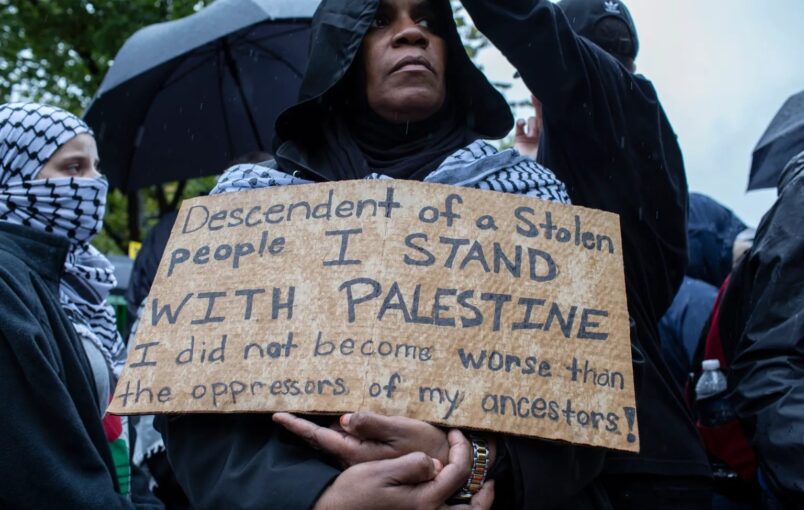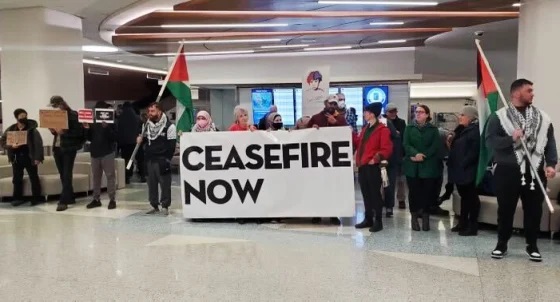Will U.S. support for Israel cost Biden his reelection?

First published on November 5, this article is still relevant, with the only difference that the carnage in Gaza has reportedly so far taken the lives of 22,000 Palestinians, an increase of 12,000 since November.
BY SOUMANOU SALIFOU
Over the past four weeks, amid Israel’s relentless bombing of the Gaza Strip in retaliation for the October 7 attack on the Jewish nation by Hamas, several polls have shown the decline of President Biden’s approval rating within his own party and among young voters. The discontent seems related to his administration’s all-out support for Israel. Muslim Americans, in particular, are furious over the growing carnage in the Gaza Strip. These developments are fueling speculations that Biden might lose the support of important voting blocs who feel that Israel is committing a genocide with the support of the United States.
U.S.-Israel: a very special relationship
United States siding with Israel in this war (as in past ones with Hamas) came as a surprise to no one. The Jewish nation has been United States’ traditional ally since U.S. President Harry Truman helped create it on May 14, 1948 and recognized it the same day.
Israel would not have survived the 1973 Yom Kippur War against its then-Arab foes without Operation Nickel Grass, the largest military airlift in American history, and be Israel as we know it today.
Israel, the only democracy in the Middle East region, became the largest recipient of U.S. aid in the world. As of 2021, Israel has received $312.5B adjusted for inflation in U.S. assistance.
Despite being only 2.5% of the U.S. population, the Jewish community in the United States stands out with its influence in national politics, in the media, and the financial might of some of its leaders.
So, history repeated itself four weeks ago when the United States jumped to Israel’s rescue again after the surprise attack of Hamas that took the lives of 1,400 innocent Israelis. The Biden administration’s support climaxed into the president’s trip to Jerusalem just ten days later, on October 17. Some analysts felt the trip was not necessary, given the president’s already-stated strong support for the Jewish state and Washington’s promise to provide logistical assistance. Others disagreed, saying that Biden’s presence underscored the importance of the relationship while sending a strong message to discourage the involvement of third-party nations, which might widen the war.

Before it even started, the president’s trip was spoiled by a massive explosion that on Tuesday, October 17 rocked the main hospital in Gaza packed with wounded Palestinians and others seeking shelter.
But that was only a prelude to the coming massacre of civilian Palestinians by Israel’s relentless bombing campaign targeting Hamas militants that Israel suspected to be hiding among civilians, using them as a shield against Israel’s bombs.
U.S. public opinion about the Israel-Hamas war

The majority of Americans support Israel in this war. However, several polls, notably the NPR/PBS NewsHour/Marist poll, found that the American public is divided along racial and generational lines.
According to the polls, only 51% of voters of color said the U.S. should publicly express its support for Israel, against 72% of whites. The division also shows on college campuses across the country, with students demonstrating in support for Palestine or Israel. Some of the youth vehemently criticized President Biden’s unequivocal support for the Jewish nation while other point out the inhumanity of Palestinians dying by the thousands under Israel’s bombs. It’s worth noting a statement put out last week by Black4Palestine, an organization of Black activists rallying behind Palestinians.
The division over U.S. stance about the war is also palpable among congressional Democrats, some of whom voted last week against a resolution supporting Israel because of the massive loss of civilian lives in Gaza—now nearing 10,000.
The outrage over the carnage and Israel’s refusal, so far, to accept a cease fire to facilitate the entry of humanitarian assistance into Gaza brought back to light the recurring criticism of the inhumane living condition brought on Gaza’s residents by Israel’s 16-year-long siege, cutting them off from the world. South African leaders have likened these conditions with the apartheid regime that they endured at the hands of the white minority in their country before the 1994 election of Nelson Mandela.
The Muslim Americans’ anger

To be reelected, Biden must have the vote of people of color, especially Blacks who always vote Democrat, and the young generations. It’s unclear now how their dissatisfaction with Biden’s support for Israel will play out in the 2024 presidential election. Unmistakably, though, no voting bloc in the country has been more angered by U.S. support for Israel than Muslim Americans who unequivocally threaten to not vote for Biden in 2024. The “Abandon Biden” movement that is boiling in a number of swing states (states that can vote for either party) is likely to cost Biden his re-election.
And the president is aware of the threat. Last Wednesday, during a visit to Minnesota, a battleground state that is home to a large community of Muslim Americans—most of whom voted for the president in 2020—he was met with protesters carrying “Abandon Biden” and “Ceasefire Now” signs.
Though vowing to “abandon” Biden, Muslim American are mindful of former president Donald Trump’s anti-Muslim rhetoric, and acts. The former president recently promised to go down the same path if reelected in 2024. While the Muslim American voting bloc may not vote for Biden in 2024, just by staying home on election day as many voters who were not enthused by Hillary Clinton did in 2016—on the theory that Trump stood no chance of winning anyway—they could do a huge disservice to Biden.
Damage control
President Biden takes the threat seriously, as evidenced by his secret meeting last Wednesday with a few hand-picked Muslim leaders. He knows he cannot afford to lose many battleground states in what is expected to be a close election in 2024. In 2016, if Hillary Clinton had won the 16 electoral votes of Muslim-vote-rich Michigan—a state that votes Democrat more often than not—and carried the swing State of Pennsylvania with its whopping 20 electoral votes; then secured the 10 votes of the Democratic-leaning State of Wisconsin that Trump carried with a margin of 0.77 percentage points, she would have beaten Trump with a total of 278 electoral votes, leaving the Republican with 260 votes. A narrow victory margin of 18 votes—but a victory all the same. This much likely scenario would have closed the door to the deep historic shift Trump’s four years at the White has brought to the United States and the world. It sometimes does not take much to change the course of history.
Traditionally, the outcome of U.S. presidential elections is determined by domestic politics—usually the state of the economy. 2024 might prove that conventional wisdom wrong.
Some analysts feel that the election being one year away, Biden could win back the Muslim American voting bloc. But Muslim American leaders are adamant, giving the impression that the deal is done. Jaylani Hussein, the executive director of the Minnesota chapter of the Council on American-Islamic Relations, CAIR (the largest Muslim advocacy group in the United States), was quoted by NBC on Wednesday as saying in a news conference following protests at the airport, in downtown Minnesota and in rural Northfield, “I don’t think that this is a rash emotional decision by the American Muslim community. It is a foregone conclusion.” He added: “The anger is not going to go away. We don’t have short memories. I still have not heard from any Muslim leader in Minnesota who has said this is a mistake.”

